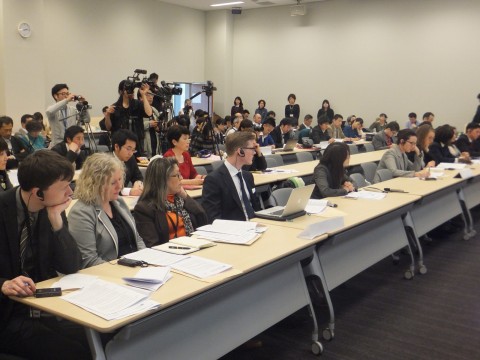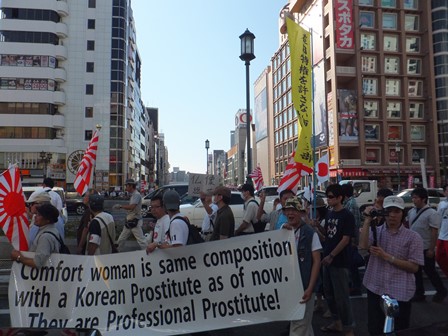Japan: ERD Net held a gathering on “Stop Racism! Stop Hate Speech!” (18 March, 2015)
April 15, 2015
On the occasion of the International Day for the Elimination of Racial Discrimination, NGO Network for the Elimination of Racial Discrimination (ERD Net) organized a gathering on “Stop Racism! Stop Hate Speech!” on 18th March to raise awareness on the situations of minority and indigenous communities in Japan.
Foreign embassies in Japan were invited to the gathering. Countries attended to the gathering were from Europe, Africa, Middle East, Americas and Asia Pacific. Other participants included Diet members, national and international media and general public.
_
 Immediately after the opening remark of the organizer, representatives of Burakumin, Ainu peoples, Ryukyu/ Okinawa, migrant women and Korean residents shared their personal experiences of racial discrimination under the theme, “Discrimination on the Ground”.
Immediately after the opening remark of the organizer, representatives of Burakumin, Ainu peoples, Ryukyu/ Okinawa, migrant women and Korean residents shared their personal experiences of racial discrimination under the theme, “Discrimination on the Ground”.
A representative from the Burakumin community shared her experiences during the time when she planned to marry her boyfriend. Without seeing her personally, his family opposed to their marriage for unclear reason. She was too shocked to leave her house for long time. Later, she was told by her friend that it was because of her Buraku origin. Then, she realized that she did not know anything about Buraku discrimination, and started to listen to stories of other members of the community. She has joined the movement, and determined not to give way to discrimination.
Ainu representative talked about his childhood living in a peaceful Ainu village in Hokkaido. It did not take long until he realized that his people were looked down and discriminated against in society. When he was in his 30’s, he understood what discrimination meant, and joined the Ainu movement. Ainu people have the history of being deprived of their land, culture, language, religion and livelihood by Japan. But, most Japanese people are not aware of this history. He emphasized that Ainu youth should be given opportunities to know their own history to restore identity and dignity.
A representative from Ryukyu/ Okinawa explained the history of Ryukyu. It was an independent state and had business transactions with countries in Asia and Europe. With the forcible annexation of Ryukyu by the Japanese ruler, the assimilation policy was implemented which denied their culture, religion, lifestyle and others. They were also deprived of their lands and natural resources. In the recent history, Ryukyu people have undergone the war, the U.S. occupation and the return to Japan. Yet, their struggle never stops against the heavy U. S. militarization, denial of self-determination and social inequality.
Migrant women often become victims of domestic violence by their Japanese husbands. Through the testimony of a migrant woman, the audience learned that migrant women are easily subject to violence and abuses by their Japanese husbands who tend to neglect their wives because of their ethnic origin and gender. With the severer conditions set out under the revised immigration control act, battered migrant wives face more difficult challenges in securing their safety as well as the legal status. She urged that the government should provide victims easy accesses to the protection while not facing the risk of revocation of their legal status.
Education for foreign children is another main issue which migrant families face in Japan. A representative from a Brazilian community addressed how they have had to endure disadvantaged status as “temporary residents” while many of them doing unpopular but much needed manual works. The lack of legal and social protection as well as social integration of migrant workers has caused a lot of difficulties. This includes a lack of educational support for foreign children, which leads to the difficulties for migrant children to adapt to the Japanese society. He urged the Japanese government to adopt an effective social integration policy for migrant workers as they also contribute to the country.
Korean schools have become one of the most disputed racial discrimination issues for Koreans residing in Japan. A mother, whose children going to a Korean school in Tokyo, remembered her deep concern about the government’s decision to exclude Korean high schools from its tuition waiver program. It has been followed by many local governments by excluding Korean schools from their own subsidy programs. It has increasingly given burden on parents who send their children to Korean schools where they learn their own language, culture and history. The government’s attitude towards Korean schools leads to the escalation of discrimination against Korean residents. Her presentation was followed by a testimony of Korean university student who personally experienced the exclusion of Korean high schools from the government program. She called for an equal treatment for Korean students.
 Racist hate speech was discussed by a lawyer from one of the Korean communities, which has been rampant in Japan mainly directing to resident Koreans. To stand against racist demonstrations with hatred and discriminatory speeches, counter actions have been taken by civil groups. Against racist attacks including the attack on the Korean school in Kyoto, perpetrators were brought to the court by victims who sought remedy. Yet, these counter actions have to face a legal limit due to the present legislation of Japan which has no specific provisions to address racial discrimination.
Racist hate speech was discussed by a lawyer from one of the Korean communities, which has been rampant in Japan mainly directing to resident Koreans. To stand against racist demonstrations with hatred and discriminatory speeches, counter actions have been taken by civil groups. Against racist attacks including the attack on the Korean school in Kyoto, perpetrators were brought to the court by victims who sought remedy. Yet, these counter actions have to face a legal limit due to the present legislation of Japan which has no specific provisions to address racial discrimination.
To conclude the series of presentations of the representatives from different communities, the speakers and organizer presented the“Proposal from the Civil Society for the Elimination of Racial Discrimination”. Despite grave human rights violations caused by racial discrimination against minority communities in Japan, the government does not take any effective measures to stop racial discrimination and provide necessary remedies. In fact, it has repeatedly been given recommendations by the UN human rights bodies to enact a law to prohibit racial discrimination and to establish a national human rights committee. By reflecting such a lack of efforts, the Proposal demanded the Japanese government and the Parliament to work together to introduce legal mechanism to eradicate racial discrimination, including immediate enactment of the Basic Law for the Elimination of Racial Discrimination.
For further information on the issues of racial discrimination in Japan, you can refer the ERD Net reports to the Committee on the Elimination of Racial Discrimination (CERD)
* NGO Network for the Elimination of Racial Discrimination (ERD Net) was formed in 2007. It is a nationwide network of more than 85 NGOs working for the elimination of racial discrimination and promotion of human rights. IMADR operates as a secretariat of the Network.
Related Content

Newsletter E-CONNECT No.40 is out

Newsletter E-CONNECT No.39 is out

Newsletter E-CONNECT No.38 is out


